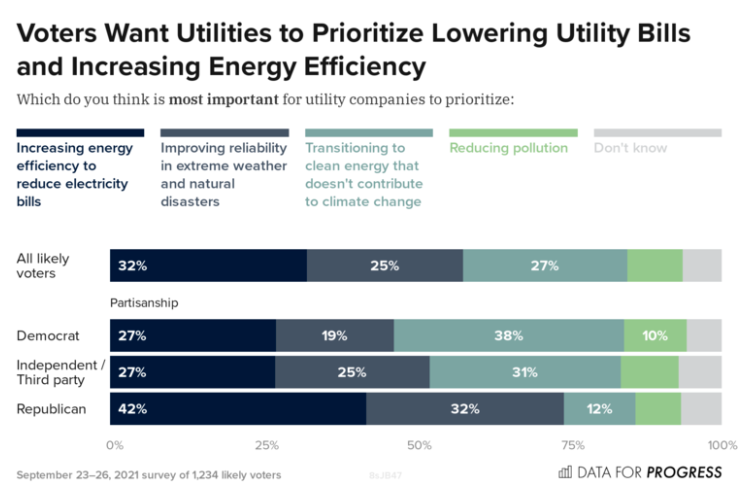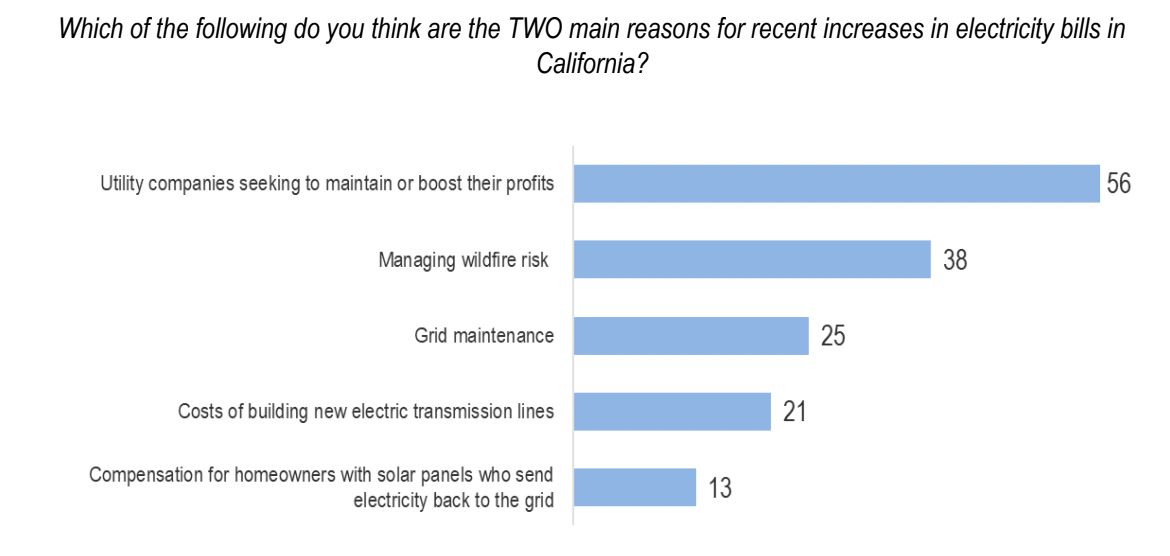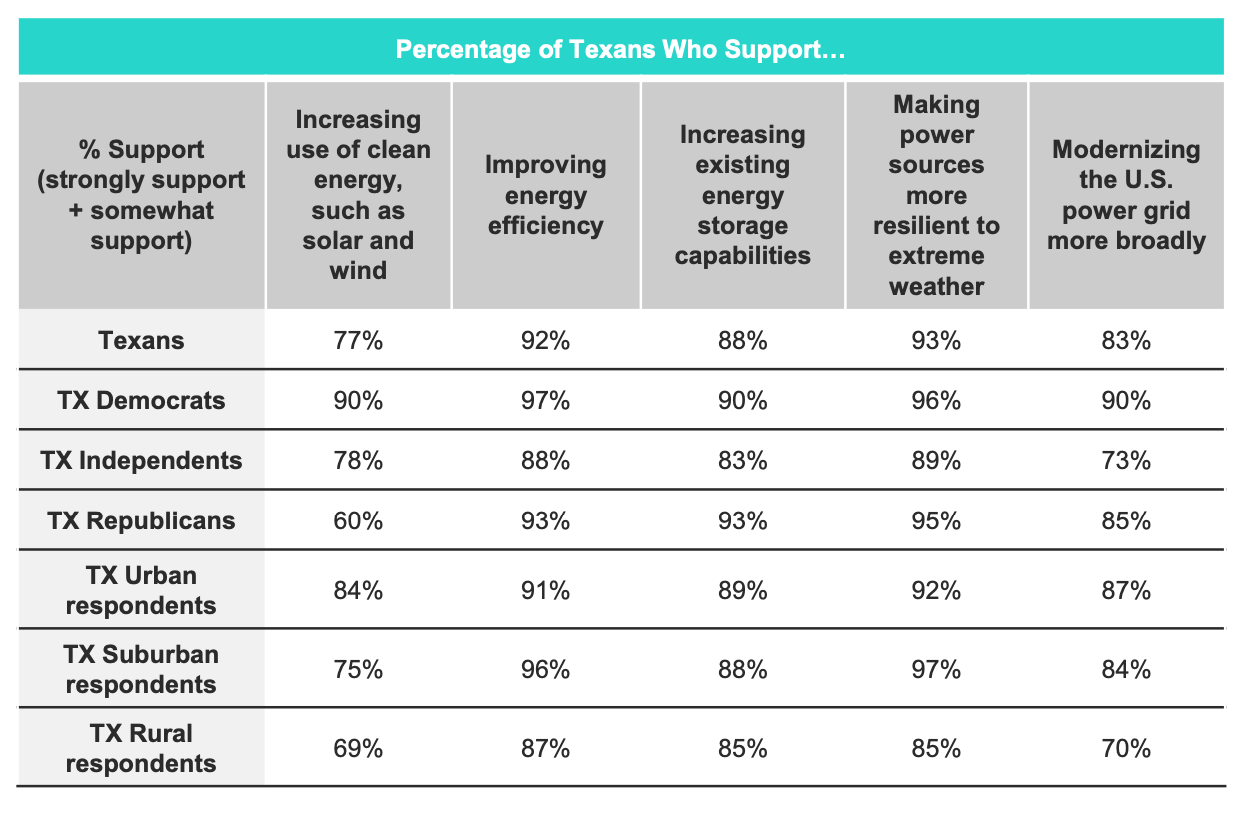Resources
Search below for resources covering the intersection of climate engagement, social science and data analytics.
RESULTS
Poll: Massachusetts Voters Want More Clean Energy
A survey of 600 registered voters in Massachusetts showed voters remain concerned about climate change and optimistic about renewable energy.
Poll: Direct Pay: Avenues Toward a Clean Energy Economy
Voters want the federal government to prioritize financial support for renewables over fossil fuels and continue to support “direct pay” reforms to make it easier for clean energy power providers to access federal tax credits. Voters want the federal government to financially incentivize clean energy production over fossil fuel extraction: when asked to choose, 58% believe the federal government should provide more of its financial support to power providers that primarily generate electricity from clean sources and 34% believe that financial support should be more focused on power providers that primarily generate electricity from oil, gas, and coal. After reading that “most businesses can’t take advantage of their clean energy tax credits directly and must strike deals with banks to get the benefits,” 71% support reforms that “would make it easier for power providers to access the government’s clean energy tax credits.” Support for these reforms spans the political spectrum, with 85% of Democrats, 70% of independents, and 57% of Republican voters in favor. Encouragingly, the poll also finds that support for “direct pay” reforms stands up to arguments that the reforms aren’t necessary. After reading the statements below from supporters and opponents of “direct pay” reforms, 65% of voters continue to support reforms to the clean energy tax credit system with just 23% opposed.
Environmental Polling Roundup - February 11th, 2022
This post includes climate and environment headlines, data points, and key takeaways from recent public polls - including a new international sustainability poll from POLITICO and Morning Consult, findings about the public’s reactions to different terms for methane gas, and state-level polls in Indiana, Maryland, and Wisconsin.
Poll: Voters Support the Clean Electricity Performance Program
Voters nationwide support the Clean Electricity Performance Program to incentivize clean energy goals for utilities. Supporters have winning arguments to use against pushback. More new national polling from Data for Progress here shows that voters support a Clean Electricity Performance Program (CEPP) by a 66%-24% margin when it is explained to them as a program wherein “utility companies that meet certain clean energy performance goals would be given incentives from the government, while those that fail to comply will be required to pay a penalty.” The top-testing pro-CEPP message in the experiment, which respondents said was more convincing than the opposition message by a 16-point margin (52%-36%), focused on the need to stand up for consumers and the planet in the face of corporate greed: “Utility companies say they are transitioning to clean energy, but they care more about their profits than your energy bills or climate change. We need the CEPP to create an electricity grid that is more reliable, cheaper, and better for the planet.”
Environmental Polling Roundup - August 6th, 2021
This post includes a roundup of climate + environment headlines from this week’s public polls, good data points to highlight, and a full roundup including key takeaways from each poll.
HEADLINES
- Climate Power + LCV - Investments in clean energy, climate action, and environmental justice bolster support for the reconciliation bill; the most persuasive messages focus on economic aspects including how the bill will lower costs for households (Slide Deck)
- Climate Power + Data for Progress - Voters support a range of climate-related proposals that were left out of the bipartisan infrastructure bill, especially clean electricity incentives, investments in energy efficiency, and investments in solar and wind (Release, Memo, Topline)
- POLITICO + Morning Consult - Voters continue to back the bipartisan infrastructure bill, especially investments in roads, bridges, and water infrastructure; voters are more split on the reconciliation package, but overwhelmingly support expanded home care for the elderly and disabled (Topline, Crosstabs)
- Data for Progress - Voters think that oil and gas companies have too much power, especially after learning about comments made by a senior Exxon lobbyist; “oil and gas companies” are a more compelling villain than “fossil fuel companies” (Release, Topline)
- Yale Program on Climate Change Communication + George Mason University Center for Climate Change Communication - Petition signing is the most appealing ask to get voters involved in climate advocacy, and there is clear interest in community preparedness groups (Summary, Full Report)
End of the Line: Environmental Justice, Energy Justice, and Opposition to Power Lines
Opposition to energy infrastructure is often labeled by developers as NIMBYism, but frontline communities have legitimate concerns and risk perceptions, or are left out of democratic decision making processes. In cases involving the siting of power lines, community groups are most successful in stopping the line or achieving remediation when they build broad coalitions of support within and outside of their communities and/or have government support at any level (including local, state or provincial, federal, and Indigenous).
Poll: After Historic Outages, Texans Favor Solar, Wind and Other Clean Energy
Polling research shows that after historic power outages in February 2021, most Texans are in favor of the state producing more renewable energy and reducing their dependency on fossil fuels.
- About six in 10 Texas voters say that the state should add solar (65%) and wind (58%) energy resources. There was less support for natural gas (45%), nuclear (28%), and coal (20%).
- 30% of Texas voters strongly agree and 26% somewhat agree that the primary goal of Texas’ energy policy should be achieving 100% clean power.
- 45% of Texas voters strongly agree and 32% somewhat agree that being a leader in clean energy innovation is important to Texas’s future.
Ask Me Anything with US Department of Energy Secretary Granholm
Secretary of Energy Jennifer M. Granholm went live for a special 30-minute “Ask me Anything” (AMA) exclusively for the Climate Advocacy Lab community. The US Department of Energy will be critical to the fight to stop climate change. Listen as community members ask questions of USDOE Secretary Jennifer M. Granholm. Our goal with this event is to get information to the field about the priorities of the US DOE and to uncover opportunities for the field to have more impact on these issues.
Poll: Widespread support for California’s existing net metering policy
A large majority of Californians support existing net metering policy, and broadly oppose a proposal that reduces credits for people who contribute solar power to the electric grid.
- 71% believe the state of California should be doing more to encourage the use of solar power vs. just 14% who say it should be doing less.
- 80% of California voters support net metering (after hearing a neutral description of the policy), vs just 11% who oppose it.
- 64% of voters oppose a proposal to “reduce the credit that people who have rooftop solar receive from their local utility for any extra electricity that their rooftop solar generates and feeds back to the grid.”
- Keeping energy bills low is a priority for California voters – and they are far more likely to blame rising electricity bills on "utility companies seeking to boost or maintain their profits" (56%) and "managing wildfire risks" (38%) than anything related to solar.
Poll: Texans’ Opinions on Recent Extreme Cold
Survey of 500 Texans in the immediate aftermath of the extreme cold weather and resulting power outages found:
- Respondents expressed concern about extreme cold (78%), power outages caused by weather events (83%), and access to clean drinking water (76%). Concern spanned community types, and was highest (80%) among rural respondents.
- 79% say it should be a priority for the U.S. to pass legislation to address climate change
- Majorities across Texas support a wide range of legislative measures to prevent future power outages, including: increasing use of clean energy (77%), improving energy efficiency (92%), increasing existing energy storage capabilities (88%), making power sources more resilient to extreme weater (93%), and modernizing the U.S. power grid more broadly (83%).
Pagination
- Previous page
- Page 3
- Next page




